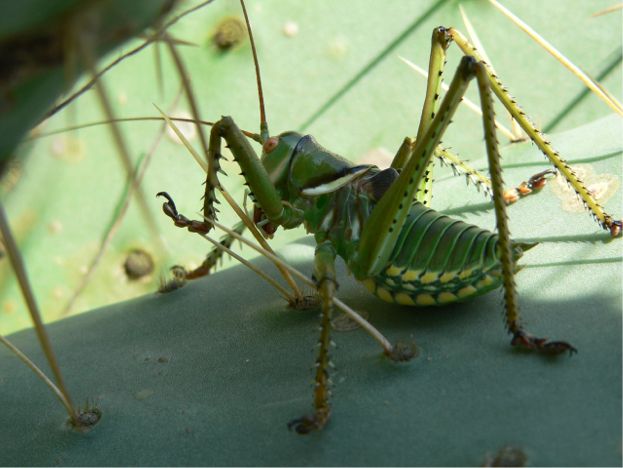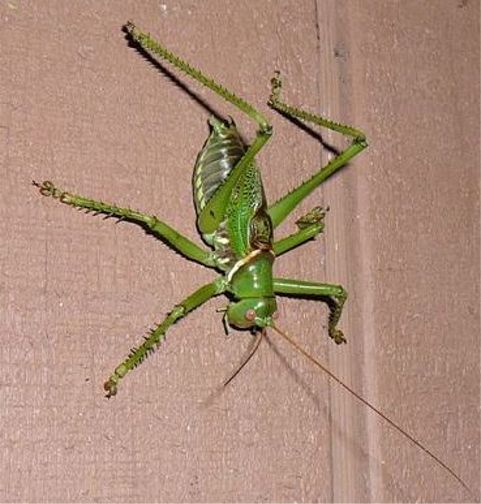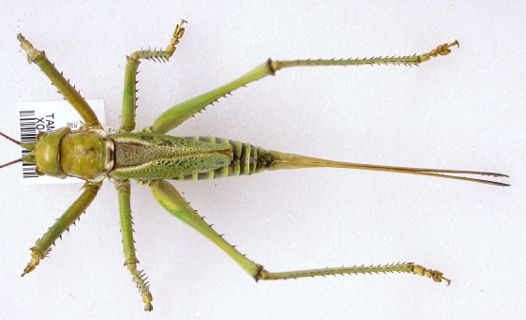 |
Return to Texas Entomology - Compiled by Mike Quinn
 |
(note diagnostic red eyes and black leading edging of the pronotum)
 |
(male)
 |
(female)
Distribution data per Singing Insects of North America website
Sound: Song of one individual singing - A short high pitched buzzy, "vzzzt", repeated at four to 10 second intervals.
Habitat: Oak-juniper, mesquite, bushland, shrubby desert.
Season: June to October.
Life cycle: One generation per year.
Behavior: Omnivorous katydid that will rear up in a formidable display if disturbed.
Similar Species: There are two species of Neobarrettia, both occur primarily in Texas:
Neobarrettia spinosa - greater arid-land katydid - "Red-eyed Devil"
Neobarrettia victoria - lesser arid-land katydid - "White-eyed Devil"The front edge of the pronotum of N. spinosa is black, whereas that of N. victoria is green.
Also, N. spinosa has red eyes, whereas those of N. victoria are pale.
Etymology: Neobarrettia
neo (G). New, recent
bar, -o, -y (G). Heavy"Red-eyed Devil" is the preferred name for this beast per Theodore Cohn who conducted the definitive research on Neobarrettia.
Biography: Andrew Nelson Caudell (1872-1936) - Journal of Economic Entomology
Bibliography:
Borror, D.J. 1960. Dictionary of Word Roots and Combining Forms. National Press Books, Palo Alto. 134 pp.
Capinera, J.L. & R.D. Scott, T.J. Walker. 2005. Field Guide to Grasshoppers, Katydids, and Crickets of the United States. Cornell University Press, Ithaca, New York. 280 pp.
Caudell, A.N. 1907. The Decticinae (a group of Orthoptera) of North America. Proceeding of the U.S. National Museum 32: 285-410.
Cohn, T.J. 1957. The relationships of the North American genera Rehnia Caudell and Neobarrettia Rehn (Orthoptera Tettigoniidae). Occasional Papers of the Museum of Zoology, University of Michigan, 588: 1-16.
Cohn, T.J. 1965. The arid-land katydids of the North American genus Neobarrettia (Orthoptera: Tettigoniidae): their systematics and a reconstruction of their history. Miscellaneous publications, University of Michigan, Museum of Zoology, no. 126. 179 pp.
Gangwere, S.K. 1990. Food selection and feeding behavior in the species of Neobarrettia Rehn, 1901, a New World genus of predacious katydid (Orthoptera: Tettigoniidae). Bol. San. Veg. Plagas 20: 291-298.
Smith, K.N., J.W. Cain, III, M.L. Morrison, and R.N. Wilkins. 2012. A Novel Songbird Nest Predator: The Greater Arid Land Katydid. American Midland Naturalist 167: 210-212.
Taber, S.W. & S.B. Fleenor. 2003. Insects of the Texas Lost Pines. Texas A&M University, College Station. 283 pp.
Taber, S.W. & S. B. Fleenor. 2005. Invertebrates of Central Texas Wetlands. Texas Tech University Press, Lubbock. 309 pp.
Walker, T.J. 1997. Chapter 16. Tettigoniinae: bush katydids (prepared for Handbook of Crickets and Katydids, an inactive project).
27 May 2008 © Mike Quinn / entomike@gmail.com / Texas Entomology / Katydids of Texas